Which Premier League Team Offers the Best Value For Money?
 Ticket prices have long been subject of debate across European football with price hikes often protested by fans. Owners want to increase revenue, while fans want prices to be affordable, especially given the current economic climate. More than once have fan groups staged walkouts with the message loud and clear that football is for the fans and exists because of them.
Ticket prices have long been subject of debate across European football with price hikes often protested by fans. Owners want to increase revenue, while fans want prices to be affordable, especially given the current economic climate. More than once have fan groups staged walkouts with the message loud and clear that football is for the fans and exists because of them.
While price hikes are sometimes unavoidable due to inflation, many Premier League clubs aim for competitive prices and try to freeze prices where possible. Yet, with fans often spending a large chunk of their income on tickets, how much value do they really get for their money? Which factors contribute to in-stadium entertainment and make it worthwhile to buy a (season) ticket?
How much do fans pay for tickets?

Oldelpaso, CC BY-SA 3.0, via Wikimedia Commons
Ticket prices are determined by several factors, including seating within a stadium and demographics of fans, like age. Fans can buy individual tickets for home and away games and season tickets.
Prices for individual tickets vary widely between clubs. For away games there is a ticket price cap of £30. The price cap was implemented in the 2016/17 season and in June 2022, Premier League clubs unanimously agreed to maintain the current cap for a further three seasons.
Cheapest and priciest season tickets
 There are also several price tiers for season tickets. Bloomberg analysed the 2022/23 Premier League clubs’ cheapest and priciest season tickets and how they have changed during a five-year period.
There are also several price tiers for season tickets. Bloomberg analysed the 2022/23 Premier League clubs’ cheapest and priciest season tickets and how they have changed during a five-year period.
For the 2022/23 season, the average price of the clubs’ cheapest season tickets amounts to £505 (Chelsea is excluded due to a lack of data).
Arsenal charges the most with £927, while fellow London club West Ham United’s cheapest season tickets are sold for £299. The ratio between top and bottom is 3.1 to 1.
Cheapest season ticket prices of Premier League teams
| What | 2018/19 | 2022/23 | Percentage change |
|---|---|---|---|
| Average | £484 | £505 | +4.3% |
| Most expensive | £891 (Arsenal) | £927 (Arsenal) | +4.0% |
| Least expensive | £297 (Newcastle) | £299 (West Ham) | +0.7% |
| Note: Chelsea excluded in 2022/23 due to unavailable data. | |||
The average price of the clubs’ 2022/23 priciest season tickets is £922. So, the average price of the priciest season tickets is 1.8 times more expensive than the average for the cheapest options.
Tottenham has the most expensive priciest season tickets (£2,025) during the 2022/23 season, while Brentford only charges £549 for their most expensive season tickets.
Priciest season ticket prices of Premier League teams
| What | 2018/19 | 2022/23 | Percentage change |
|---|---|---|---|
| Average | £882 | £922 | +4.5% |
| Most expensive | £1995 (Spurs) | £2,025 (Spurs) | +1.5% |
| Least expensive | £499 (Brentford) | £549 (Brentford) | +10.0% |
| Note: Chelsea excluded in 2022/23 due to unavailable data. | |||
Price rise since 2018/19
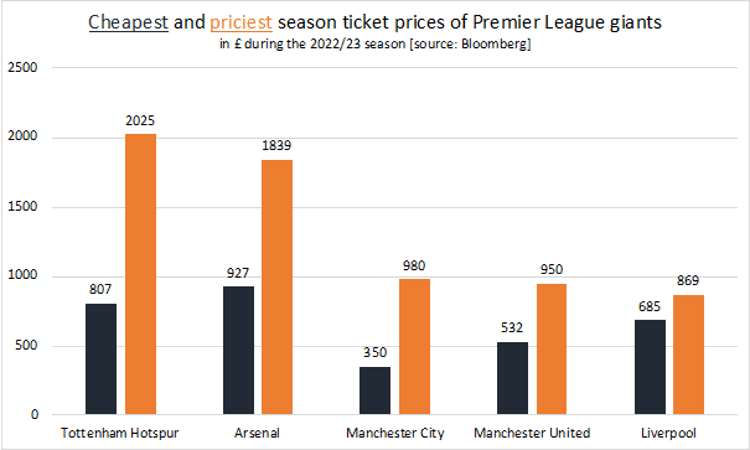
Compared to 2018/19, the average price of the cheapest and priciest tickets has risen by 4.3 and 4.5 percent respectively. While it is a significant increase, it is far less than the amount that prices have risen in general due to inflation during that period.
Notable is that Brentford increased the prices of their priciest season tickets by 10 percent between 2018/19 and 2022/23. This increase could be explained by the club’s new stadium that opened in 2020 and promotion to the Premier League.
Freezing ticket prices
Most Premier League teams have made changes to their ticket prices since 2018/19, some seasons increasing, some seasons decreasing prices. Fulham is the only current Premier League club whose 2022/23 priciest and cheapest season tickets are both cheaper than in 2018/19. While Bournemouth, Liverpool and Manchester United are the only three clubs who froze both their cheapest and priciest season ticket prices during this period.
Especially the owners of Liverpool, Fenway Sports Group, will be careful to increase ticket prices. They planned to do so after the 2015/16 season. However, thousands of fans protested the plans, even staging a walkout after which the team went on to draw despite a 2-0 lead. Ultimately, it led to the owners dropping their plans.
For the 2022/23 season, 11 out of 19 Premier League clubs (Chelsea is excluded due to a lack of data) increased their priciest season ticket prices. While nine out of 19 clubs increased the price of their cheapest season tickets this season, with West Ham United the only club to reduce these tier tickets.
How many hours of work to afford season tickets?
 For many fans even the cheapest season tickets are expensive. People who earn a national living wage – which is £9.50 in England since April 2022 – must work a minimum of 54 hours to pay for the average cheapest season tickets.
For many fans even the cheapest season tickets are expensive. People who earn a national living wage – which is £9.50 in England since April 2022 – must work a minimum of 54 hours to pay for the average cheapest season tickets.
Arsenal fans earning the national living wage must work at least 98 hours to pay for a season ticket.
So, it is no surprise that fans want, and deserve, value in the form of championships, goals, competitiveness, and entertainment, for the hard-earned money they spend.
How many fans can realistically dream of the championship?
 Since the start of the Premier League in 1992/93, there have been seven different champions: Manchester United (13), Manchester City (6), Chelsea (5), Arsenal (3), Blackburn Rovers, Leicester City and Liverpool (all 1).
Since the start of the Premier League in 1992/93, there have been seven different champions: Manchester United (13), Manchester City (6), Chelsea (5), Arsenal (3), Blackburn Rovers, Leicester City and Liverpool (all 1).
With 50 different teams competing in the competition during those 30 seasons, it means that fans of only 14 percent of the clubs saw their team win the league at least once.
Number of champions across the Big Five leagues between 1992/93 and 2021/22
| League | Number of champions | Record champion |
|---|---|---|
| Premier League | 7 | Manchester United (13 – 43%) |
| Bundesliga | 6 | Bayern Munich (20 – 67%) |
| La Liga | 5 | Barcelona (14 – 47%) |
| Ligue 1 | 10 | PSG (9 – 30%) |
| Serie A | 5 | Juventus (14 – 47%) |
Only Ligue 1 fans saw a higher number of different champions during that period. The French competition saw 10 different champions since 1992/93 (Marseille was stripped of their 1992/93 championship after bribery charges). However, since Qatar Sports Investments bought PSG in June 2011, PSG has dominated the league by winning eight out of 11 possible championships.
The data of the last three decades shows that in general there are only a handful of clubs in the Big Five leagues who can realistically compete for the title. And thus, only a portion of fans can truly enjoy the entertainment of a title fight.
Goals scored at home games
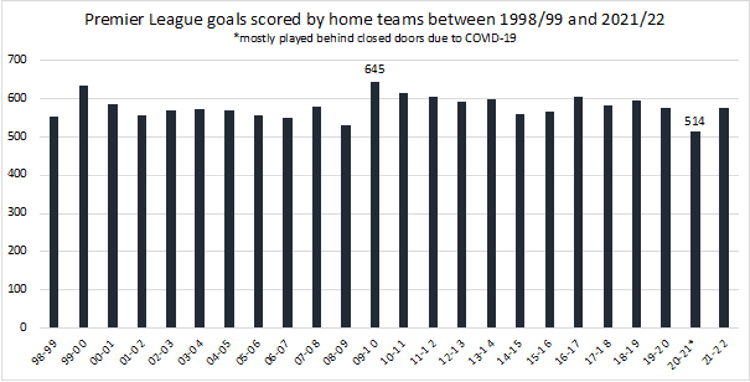
The majority of stadium-going fans need to get value for their money from other aspects, such as goals scored.
Between 1998/99 and 2021/22 a total of 13,897 goals were scored by home teams in the Premier League. This is 57 percent of the total goals scored during this period. The highest amount of home goals during this time was recorded in 2009/10 with 645 goals. While the 2020/21 season, which was mostly played without fans due to COVID-19, had only 514 home goals.
During the 24 seasons since 1998/99, teams playing at home scored on average 1.52 goals per game. However, there are major differences between teams. Huddersfield Town had the lowest average home goals during this period. The Terriers scored 0.68 goals at home during their two seasons in the Premier League.
The highest average number of home goals is recorded by Manchester United with 2.14 goals scored per game (covering 24 seasons). United is one of only five teams whose average number of home goals is above two per game. With Manchester City, Arsenal (both 2.12), Chelsea (2.05) and Liverpool (2.01) the other high scoring home teams.
Goals conceded at home
 Apart from scoring on average at least twice at home, these are also the only clubs who conceded on average less than one goal during a home game. With Liverpool conceding the least amount of all with 0.78 goals per game conceded at Anfield. Blackpool conceded the most per home game during this period with 1.95 goals conceded during their 2010/11 Premier League campaign.
Apart from scoring on average at least twice at home, these are also the only clubs who conceded on average less than one goal during a home game. With Liverpool conceding the least amount of all with 0.78 goals per game conceded at Anfield. Blackpool conceded the most per home game during this period with 1.95 goals conceded during their 2010/11 Premier League campaign.
Since the 1998/99 season, there have been 47 different teams in the Premier League. 27 of them, or 57 percent, have on average scored more goals than they conceded at home games. Blackpool, Cardiff, and Manchester City are the only three teams whose fans have seen on average more than three goals (own team plus opposition) per home game. However, out of those three only City outscored their opponent on average during their Premier League matches.
Who outscored opponents of the current Premier League crop?
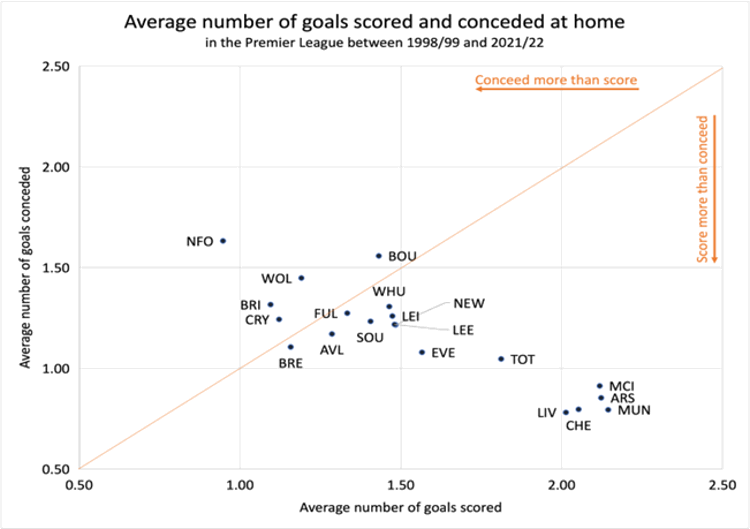
Of the 2022/23 Premier League teams, fans of five clubs (25%) have seen their team being outscored on average while in the Premier League (between 1998/99 and 2021/22).
Bournemouth is one of them. During their five Premier League campaigns between 1998/99 and 2021/22, the team scored on average 1.43 goals, while conceding 1.56.
Despite being outscored on average, fans of the Cherries have seen 2.99 goals per home game. A total that makes them come only second to Manchester City of the current Premier League crop.
Premier League Top Six in last five seasons
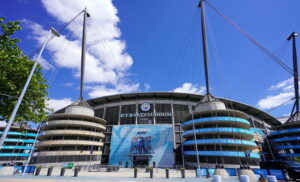 Since 1998/99, the Premier League Top Six, apart from Spurs, all scored over two goals per home game while conceding less than one. During the period 2017/18 to 2021/22, a different picture can be observed.
Since 1998/99, the Premier League Top Six, apart from Spurs, all scored over two goals per home game while conceding less than one. During the period 2017/18 to 2021/22, a different picture can be observed.
The change is good news for Manchester City, Liverpool, and Tottenham fans. These clubs scored on average more and conceded less at home games than in the period prior. While Arsenal, United and Chelsea fans saw their teams concede more, while scoring slightly less on average in recent years.
Premier League Top Six at home between 2017/18 and 2021/22
| Club | Won | Draw | Lost | Goals for | Goals against |
|---|---|---|---|---|---|
| Arsenal | 60 | 17 | 18 | 191 | 98 |
| Chelsea | 52 | 26 | 17 | 167 | 84 |
| Liverpool | 72 | 17 | 6 | 230 | 65 |
| Manchester City | 77 | 8 | 10 | 276 | 71 |
| Manchester United | 54 | 24 | 17 | 181 | 101 |
| Tottenham Hotspur | 60 | 13 | 22 | 183 | 88 |
City and Liverpool fans get value

Chabe01, CC BY-SA 4.0, via Wikimedia Commons
In the past five season, Manchester City and Liverpool fans have probably received the most value for their money at home games based on performance. City were crowned champions four times during this period. They recorded the most home wins (77 out of 95), scored the most goals (276) and had the best goals difference (+205).
Liverpool fans saw their team concede the least number of goals (65) during these five seasons, while they also experienced the lowest number of losses. Between 2017/18 and 2021/22, Liverpool lost only six games at Anfield. All those losses came during the 2020/21 season, when most of the games were played behind closed doors due to COVID-19.
During the four other seasons, Klopp’s men did not lose a game at home. This does not necessarily translate to them having won the most points at home, as Liverpool only achieved that during the 2019/20 and 2021/22 seasons. During the 2017/18 season, for example, Liverpool had only the fourth best home record with 43 points despite not losing at home. The team lost out on points by drawing seven times at Anfield that season.
However, recording no home loss in four out of five seasons is a unique achievement. PSG is the only other team to have recorded more than one season (during the 2018/19 and 2021/22 seasons) without any home losses during this period. Barcelona (2017/18), Juventus (2018/19), Real Madrid (2019/20), Bayern Munich and Eintracht Frankfurt (both 2020/21) are the only other clubs (from the Big Five leagues) to achieve a season without a home loss during those seasons.
Premier League vs. other Big Five leagues in 2021/22
| League | Teams | Total goals | Home goals | Home goals / team |
|---|---|---|---|---|
| Premier League | 20 | 1,071 | 575 | 28.8 |
| Bundesliga | 18 | 954 | 539 | 29.9 |
| La Liga | 20 | 951 | 540 | 27 |
| Ligue 1 | 20 | 1,067 | 601 | 30.1 |
| Serie A | 20 | 1,089 | 571 | 28.6 |
During the 2021/22 Premier League season, a total of 1,071 goals were scored. For a 38-game season that was only one shy of the record set during the 2018/19 season. Compared to the other Big Five competitions the league ranked second behind Serie A in total number of goals scored. Premier League fans saw 575 goals scored by the home team during the 2021/22 season, only second to Ligue 1 in absolute terms. In relative terms the Premier League came in third as the Bundesliga (consisting of only 18 teams) had a higher number of home goals per team.
During the season, Manchester City scored the most goals at their own stadium with 58. Among the Big Five leagues, City also led the ranks with goals scored at home, followed by Dortmund (52) and Rennes (50). Liverpool was tied for fourth place with PSG (both 49).
Higher percentage of points won at home when fans attend
 Across the Big Five leagues in 2021/22, 55 percent of the goals scored were at home. For the Premier League this was 54 percent in both 2021/22 and during the period between 2017/18 and 2021/22.
Across the Big Five leagues in 2021/22, 55 percent of the goals scored were at home. For the Premier League this was 54 percent in both 2021/22 and during the period between 2017/18 and 2021/22.
A similar percentage of points is collected at home in the Premier League. During four out of the last five seasons, around 55 to 59 percent of points awarded in the Premier League were collected at home. With the 2020/21 season, played largely behind closed doors due to COVID-19, being the exception (49 percent).
Meaning that fans get more value at their home ground than they do at away grounds. And that fans likely positively impact the results at home.
Premier League points between 2017/18 and 2021/22
| Points | 2017/18 | 2018/19 | 2019/20 | 2020/21* | 2021/22 |
|---|---|---|---|---|---|
| Total | 1,041 | 1,069 | 1,048 | 1,057 | 1,052 |
| At home (% of total) | 618 (59%) | 614 (57%) | 608 (58%) | 515 (49%) | 577 (55%) |
| Champion | 100 | 98 | 99 | 86 | 93 |
| UCL (ranked 4th) | 75 | 71 | 66 | 67 | 71 |
| Stay up (ranked 17th) | 36 | 36 | 35 | 39 | 38 |
| * Mostly played behind closed doors due to COVID-19 | |||||
End of the season excitement
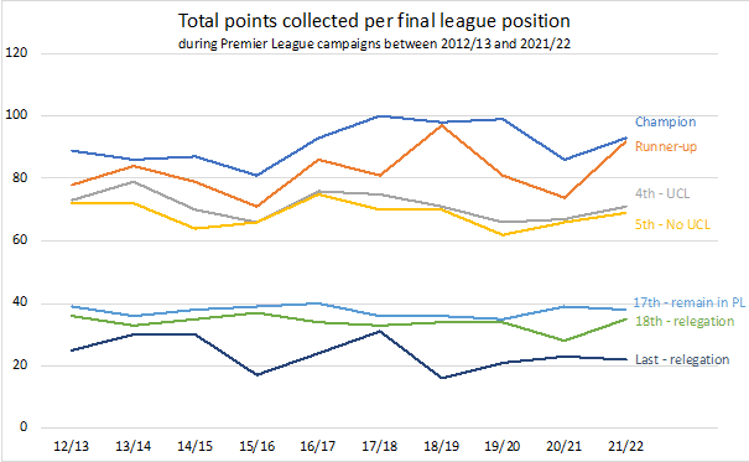
League competitiveness is also a factor contributing to the value fans get. Fans want end of the season excitement and will get more money’s worth when there is. Since the 2011/12 season, four title races have been determined on the final day of the season. With the most spectacular final matchday taking place in 2011/12 when City were crowned champions based on goal difference. But it is not always like that, Liverpool won the 2019/20 campaign with a record seven matches to spare.
Add to this, that there are only a handful of teams who realistically play for the title, and the excitement must thus come from other battles as well. Such as the relegation battle and the race for European tickets.
Between 2012/13 and 2021/22, the biggest difference between points won by the champion and the team coming last was 82 (2018/19). The smallest difference was during the 2013/14 season, when there was a 56-point gap. Implying a more competitive season.
During the ten seasons, the race for the final Champions League (UCL) ticket (4th place) and the relegation battle (17th place) have consistently been close with on average one or two matches making the difference.
Fan engagement
 Apart from excitement gained from seeing goals, rivalries, competition for European tickets or relegation, there are also other factors contributing to fans’ experience. The matchday experience may be largely influenced by a team’s on-field performance, but factors such as stadium atmosphere and accessibility, concessions on offer and other fan activities play an important role as well.
Apart from excitement gained from seeing goals, rivalries, competition for European tickets or relegation, there are also other factors contributing to fans’ experience. The matchday experience may be largely influenced by a team’s on-field performance, but factors such as stadium atmosphere and accessibility, concessions on offer and other fan activities play an important role as well.
In addition, fans want to be heard by clubs, so their club improves, and they get the best value for their money. This desire for dialogue and involvement is an aspect of fan engagement that has been researched with the Fan Engagement Index. A metric that goes beyond in-stadium entertainment and measures factors such as dialogue, governance, and transparency for clubs from England’s four highest divisions.
During the 2020/21 season, Everton scored the highest number of points (105 out of a possible 240) among Premier League teams. Overall, the Toffees ranked 20th. Southampton and Brighton and Hove Albion ranked second and third among Premier League teams (ranked 35 and 36 overall) with 85 points. While Newcastle was the lowest scoring Premier League club with 30 points, coming 87 overall (out of a total of 92 clubs).
Fans willing to pay for tickets with record attendance in 2021/22
 Attendance figures show that Premier League fans believe they get enough value for their money. In 2021/22, a record total of almost 15.2 million people attended the 380 Premier League matches. The average attendance amounted to 39,989 per game, while attendance utilisation reached 97.7 percent.
Attendance figures show that Premier League fans believe they get enough value for their money. In 2021/22, a record total of almost 15.2 million people attended the 380 Premier League matches. The average attendance amounted to 39,989 per game, while attendance utilisation reached 97.7 percent.
Compared to 2018/19 (pre COVID-19) total attendance rose by 3.9 percent (2018/19: 14.6m), while average utilisation was 2.6 percent point higher (2018/19: 95.1%).
Premier League attendance figures
| 2018/19 | 2021/22 | Change | |
|---|---|---|---|
| Total attendance | 14,623,992 | 15,195,647 | +3.9% |
| Average attendance | 38,484 | 39,989 | +3.9% |
| Average utilisation | 95.1% | 97.7% | +2.6% points |
Manchester United had the highest average attendance figure during the 2021/22 season with 73,156. However, their 97.7 percent stadium occupancy was not the highest among Premier League clubs. Leicester City had that honour, with an average attendance figure of 31,940 they had a 99 percent occupancy. 14 out of 20 clubs had an average utilisation of over 95 percent during the season, with Burnley recording the lowest occupancy (87.8%).
Total attendance and stadium utilisation is also much higher now than it was over two decades ago. In 1999/2000, average attendance was only 31,180 with a stadium utilisation of 91 percent. So, despite more supply through digital channels, (more) fans want to pay to see their team play live.
Fans’ demand for tickets is one of the best indicators of whether they believe the product on offer is worth the price. With demand going strong and record crowds, it seems fans get enough value for their money. However, owners should continue to price their tickets as competitively as possible, since the past has shown that fans can be very vocal when it comes to price hikes.



